Year 2023
The annual reports of the Finnish Academy of Science and Letters are published annually in the Yearbook. Below is an outline of the Academy’s activities for 2023.
The Finnish Academy of Science and Letters is a broad-based learned society founded in 1908 with the principal aim of promoting scientific research, acting as a bond between those engaged in advanced research and supporting better utilisation of high-quality research in decision-making.
Governing Board
The year 2023 was the 116th year of operation of the Finnish Academy of Science and Letters. The President of the Governing Board of the Academy in 2023 was Kimmo Kaski and the Vice President was Tuula Linna. Pekka Ilmakunnas continued as Treasurer of the Board, Juha Kinnunen as Secretary of the Section of Science and Päivi Pahta as Secretary of the Section of Humanities. The ordinary members were Riitta Julkunen-Tiitto, Tiina Kinnunen, Heikki Mannila and Jukka Westermarck. The Governing Board held nine meetings during the year. Pekka Aula continued as Secretary General.
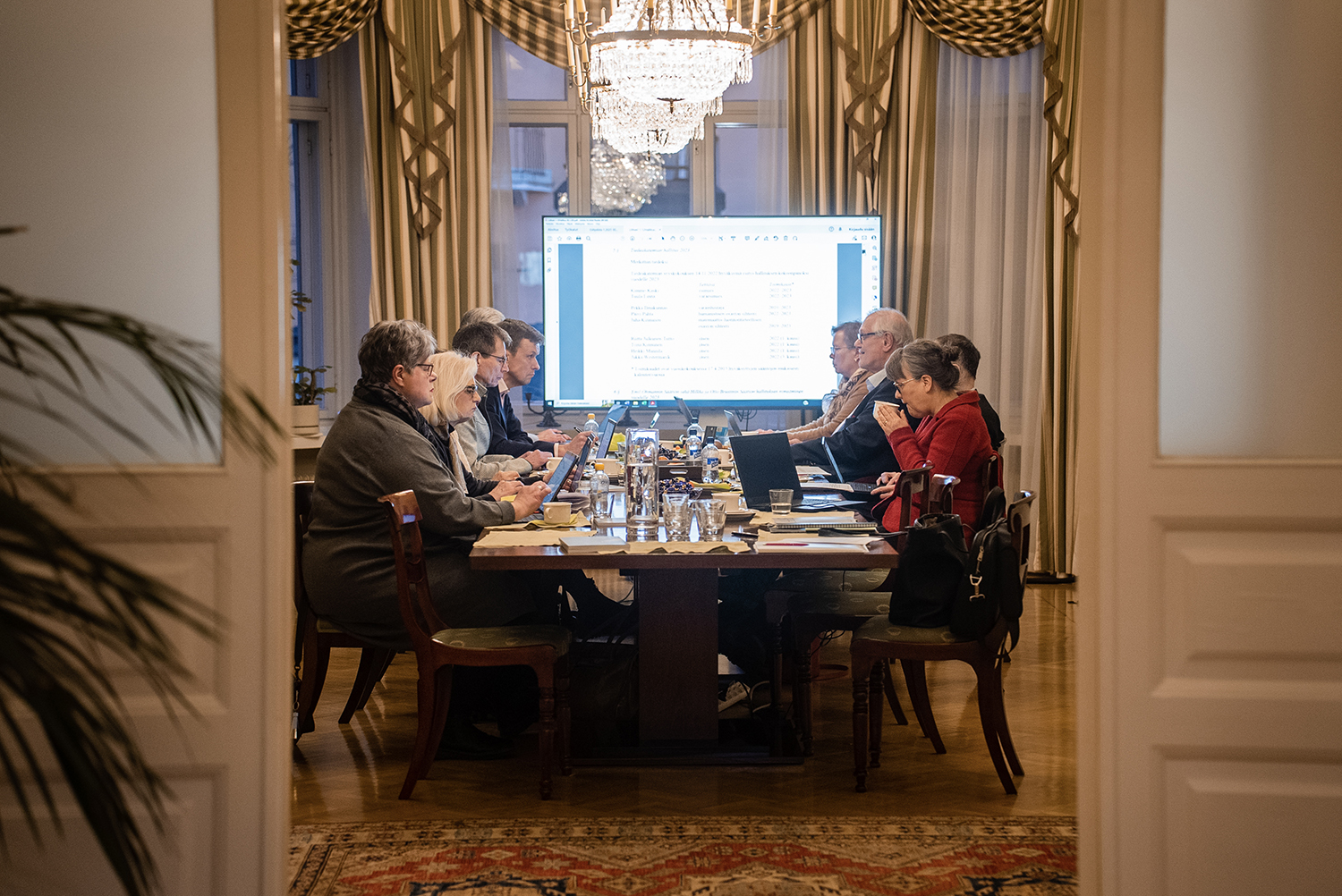
The members of the Governing Board served during the year as trustees of the Emil Öhmann Foundation and the Hilkka and Otto Brusiin Foundation.
The committees and working groups set up by the Governing Board were Property Management Committee, Prizes Committee, Publications Committee, Ethics Committee and the Emil Aaltonen Fund.
Both sections have a Selection Committee for the choosing of new members. The committee members shall be nominated by the Academy’s Autumn Meeting.
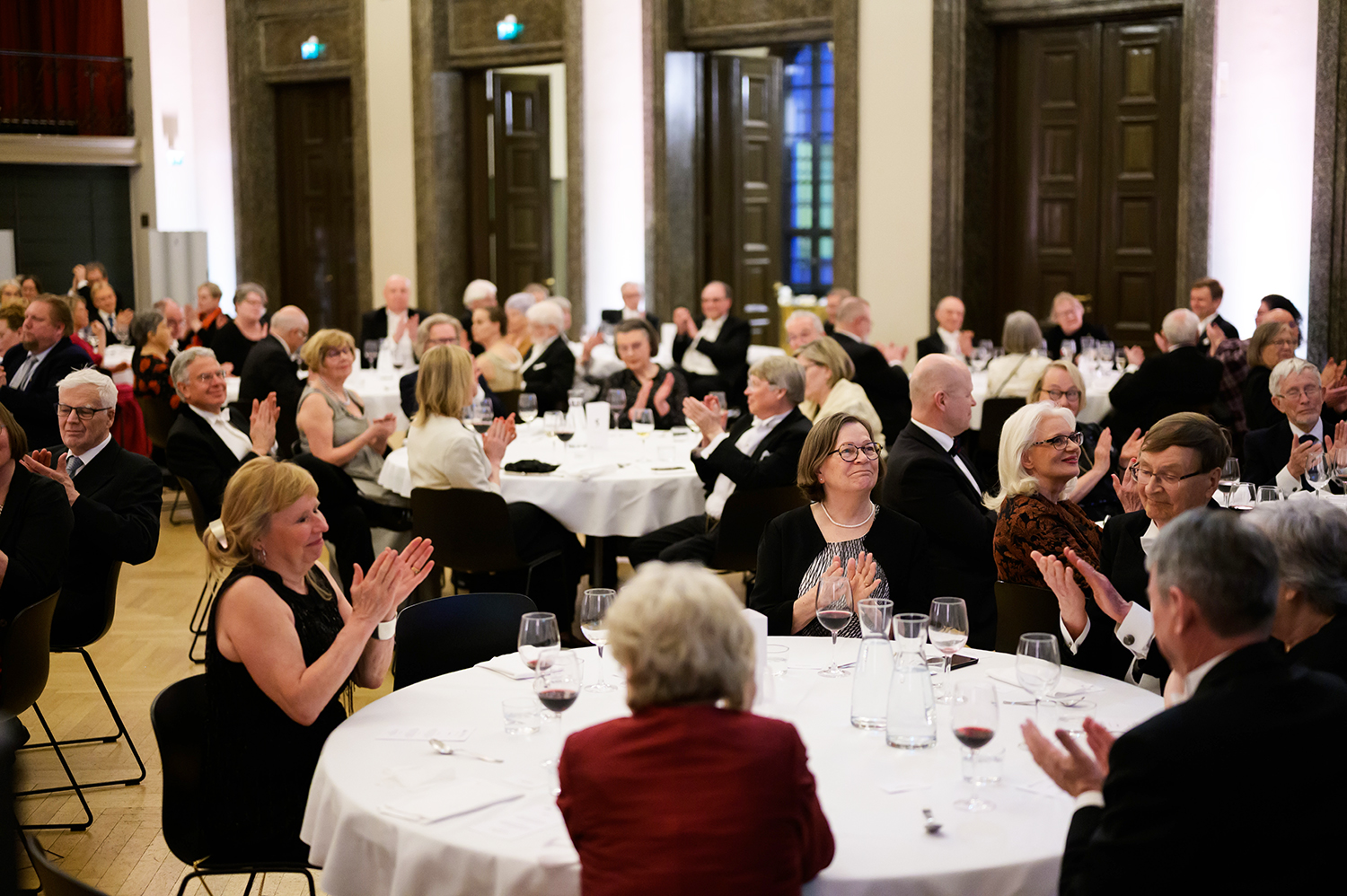
Membership
The Finnish Academy of Science and Letters had 843 Finnish members and 161 external members at the end of 2023.
Altogether 29 new Finnish members were elected in the Spring Meeting on 28 April. No new external members were elected.
The new members elected to the Section of Science were Tero Aittokallio (OCBE, Norway), Anu Kankainen (University of Jyväskylä), Timo Lakka (University of Eastern Finland), Jyri-Pekka Mikkola (Åbo Akademi University and Umeå University, Sweden), Marko Mäkelä (University of Turku), Mikko Möttönen (Aalto University and VTT), Marko Salmi (University of Turku), Tiina Sikanen (University of Helsinki), André Sourander (University of Turku), Liisa Tyrväinen (Natural Resources Institute Finland), Pekka Vallittu (University of Turku), Baoru Yang (University of Turku) and Monika Österberg (Aalto University).
The new members elected to the Section of the Humanities were Pertti Ahonen (University of Jyväskylä), Sarah Green (University of Helsinki), Henrietta Grönlund (University of Helsinki), Tuomas Heikkilä (University of Helsinki), Jari Hietanen (Tampere University), Timo Kivimäki (University of Bath, UK), Laura Kolbe (University of Helsinki), Tomi Laamanen (University of St. Gallen, Switzerland), Esa Lehtinen (University of Jyväskylä), Petri Luomanen (University of Helsinki), Sakari Melander (University of Helsinki), Kai Mikkonen (University of Helsinki), Tuomas Ojanen (University of Helsinki), Taina Pihlajarinne (University of Helsinki), Ville Pönkä (University of Helsinki) and Camilla Wide (University of Turku).
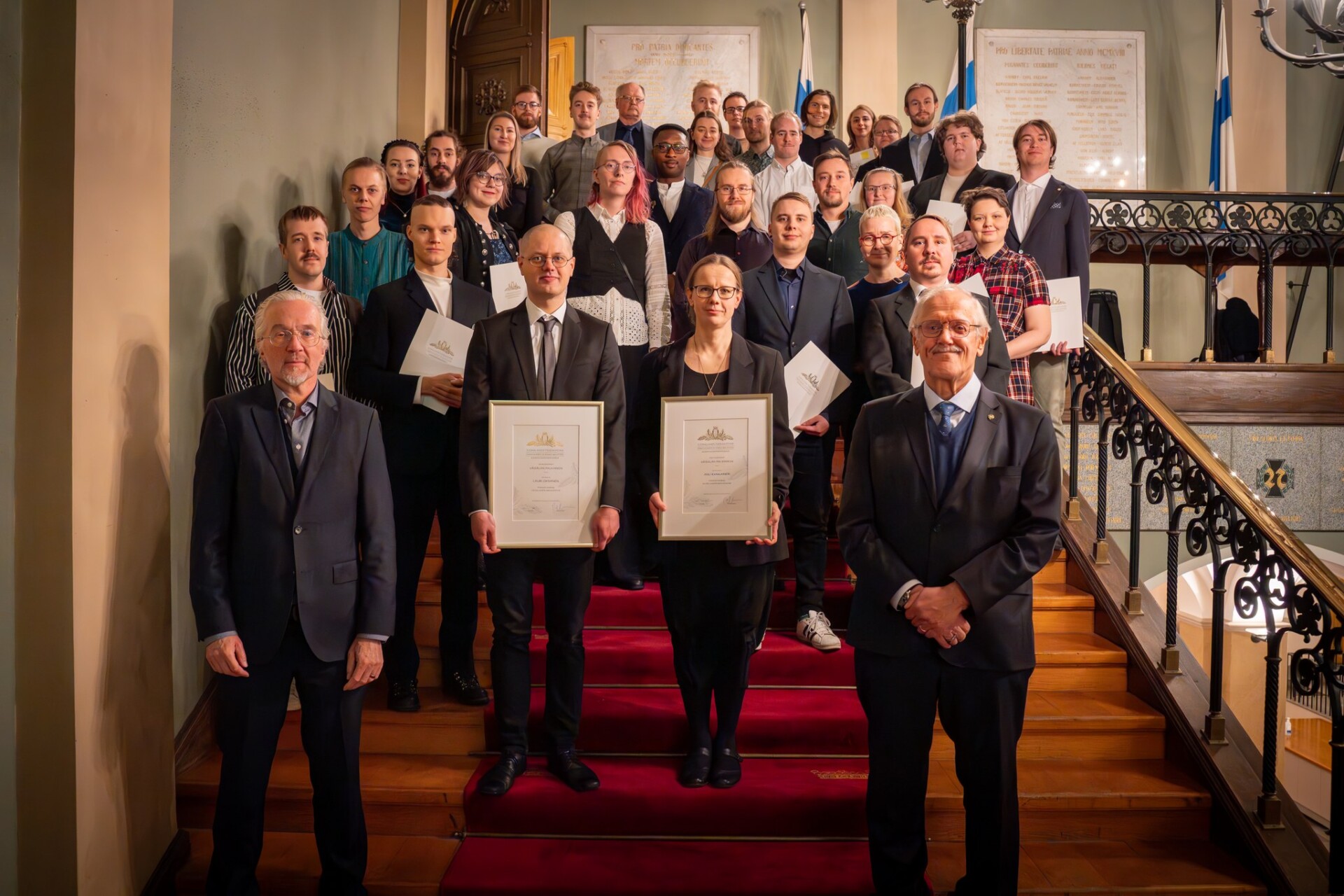
Grants
The Finnish Academy of Science and Letters distributed over 2.6 million euros in grants in 2023. The majority of these grants were for young post-graduate researchers. A full-year grant for post-graduate study was worth 26,000 euros. No grants were awarded to Academy members.
This was the 59th time that grants for research in mathematics and natural sciences were distributed from the Vilho, Yrjö and Kalle Väisälä Fund. Approximately 1.65 million euros was awarded in grants. Grants from the Väisälä Fund were awarded to 75 applicants. These included 53 post-graduate grants of 26,000 euros for full-time academic study for a duration of one year and 18 grants for part of a year. No grants were awarded for research costs in addition to post-graduate grants. A total of 4 grants were awarded for short-term research visits abroad.
The first Väisälä projects grants of the Finnish Academy of Science and Letters were awarded during the year. These grants are intended for researchers working in Finland at the early stages of the tenure track to set up their research group and cover the group’s research costs. The three-year project grant worth 150,000 euros was awarded to two researchers.
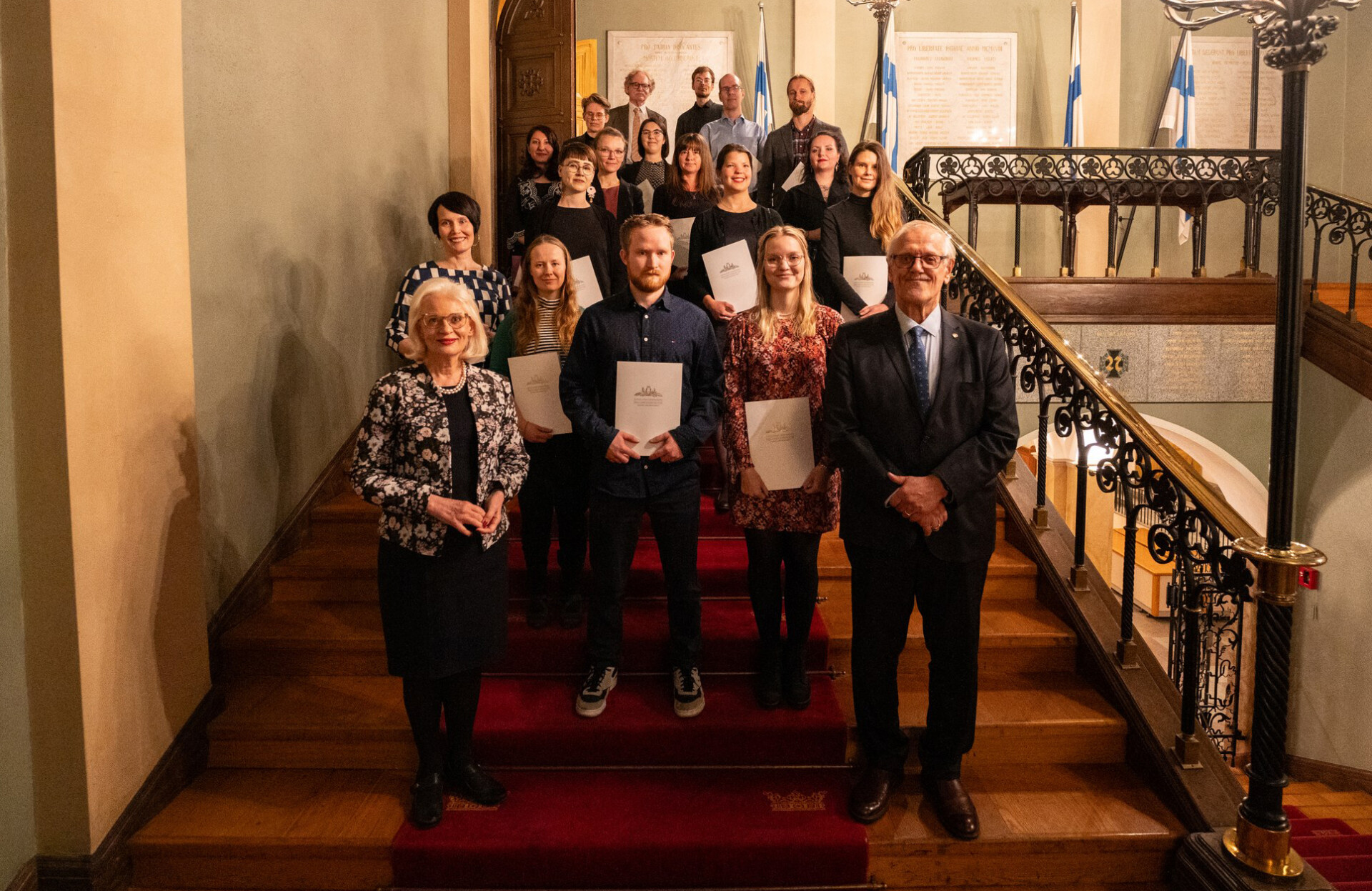
The Eino Jutikkala Fund distributed grants for research in the humanities for the 16th time. The application fields under the Academy’s Section of the Humanities are divided into two baskets, and applications in aesthetics, Finno-Ugric studies, philosophy, pedagogy, linguistics, psychology, art research, theology and religious studies were invited this year. Grants from the Jutikkala Fund were awarded to 19 applicants, about 499,640 euros in total. A total of 2 grants were awarded for research costs in addition to post-graduate grants. All these grants were for the commencement of doctoral studies.
The Academy’s Mathematics Fund distributed roughly 32,440 (114,000) euros in grants and prizes. The Emil Öhmann Foundation, which is administered by the Academy, distributed 57,000 euros in grants. The foundation also awarded 2 grantees an Institute grant worth 3,000 euros for short-term research at the Finnish Institute in Germany in Berlin.
The year 2023 was the eighth year that the Academy took part in the Finnish Foundations’ Post Doc Pool. The sum that was set to be distributed in 2023 was 200,000 euros. The grants awarded in 2023 amounted to 130,000 euros from the Väisälä Fund and 59,000 euros from the Jutikkala Fund. The unawarded sum was transferred to be awarded in 2024.
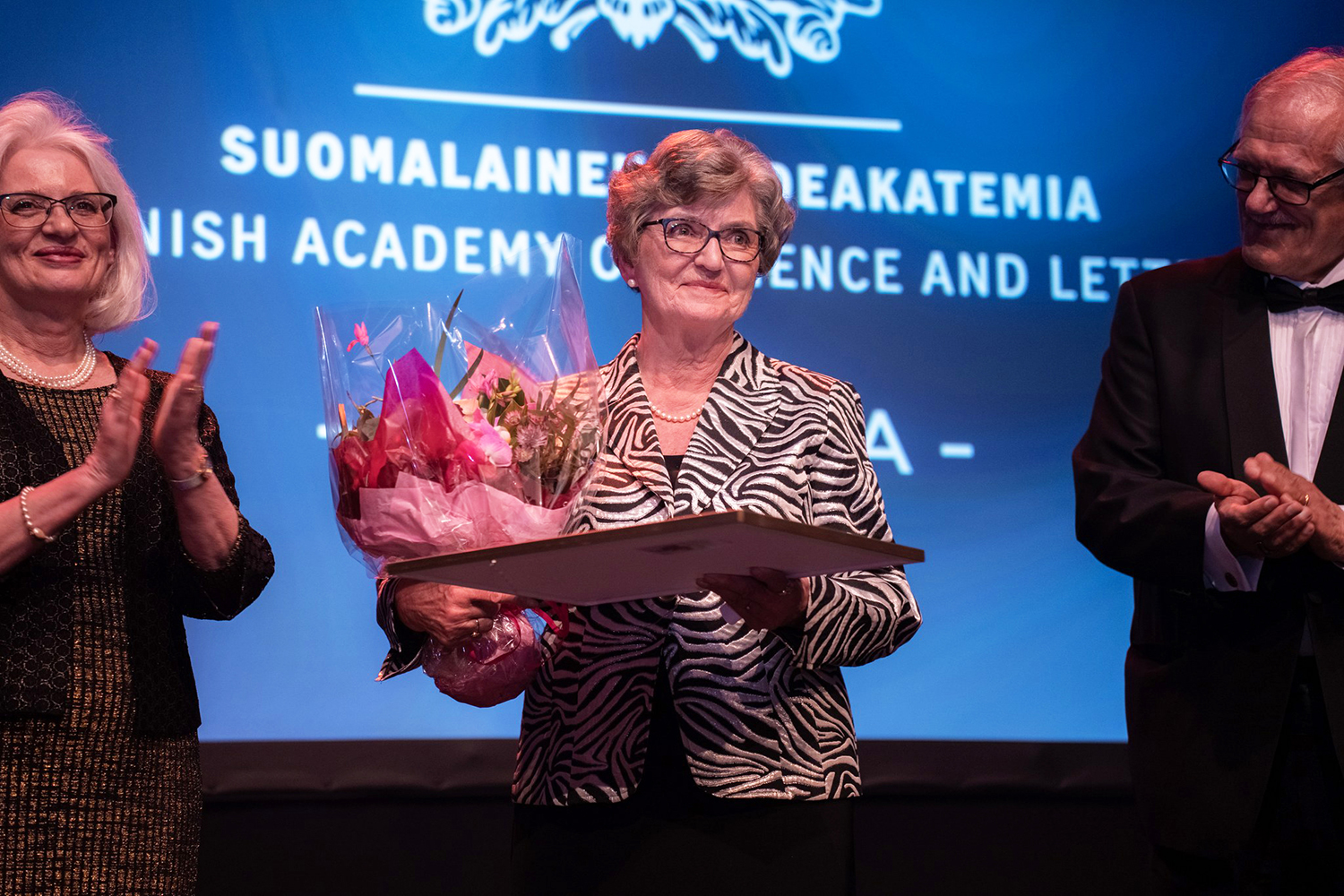
Prizes
The 2023 Academy Award of the Finnish Academy of Science and Letters, a sum of 30,000 euros, was presented to Professor of Psychology Lea Pulkkinen for her impressive career. Pulkkinen was also presented with Academy Medal No. 38.
The Finnish Academy of Science and Letters Prize for the Humanities, now awarded for the 13th time and amounting to 15,000 euros, was awarded to University Researcher Christian Hakulinen from the University of Helsinki.
The Academy’s Väisälä Prizes 2023 were given to Professor Anu Kankainen from the University of Jyväskylä and Professor Lauri Oksanen from the University of Helsinki. These prizes were now awarded for the 24rd time, and they are worth 15,000 euros each.
Awarded every two years, the Pro Scientia Prize was presented to Professor Juhani Knuuti. The value of the prize is 10,000 euros.
Over the course of the year, the Academy proposed candidates for the following prizes: the Gad Rausing Prize, the Holberg Prize, the Keio Medical Science Prize, the Louis-Jeantet Prize and the Nils Klim Prize. As for national awards, the Academy proposed candidates during the year for the Alfred Kordelin Prize and the Science Award of the Federation of Finnish Learned Societies.
The History of Science in Finland
Following the preparations in the previous year, the project entitled The History of Science in Finland was launched during the year under review. The project is coordinated by the Finnish Academy of Science and Letters and the Finnish Society of Science and Letters. The aim of the project is to produce new knowledge, a series of books and an online database on the history of science in Finland during its independence. The project makes extensive use of interview material and recollections, some of which were collected during the year. The project manager is Docent Stefan Nygård who works at the Academy. The steering group of the project includes representatives from seven organizations.
The opening seminar of the project, “Practice and place in the history of science and knowledge”, was held in June.

Meetings and events
The Finnish Academy of Science and Letters organized public events throughout the year 2023. The thematic meeting in March was held at the House of the Estates, but after renovation of the building began in autumn 2023, the events were moved to the House of Nobility. The events were also streamed live online. The thematic meetings gathered a total of approximately 1,100 participants. The recordings of the events are available for the time being on the website of the Academy.
13 Feb. Thematic meeting: Tekoäly (“Artificial intelligence”)
- House of Nobility and live stream online
- Speakers: Associate Professor Riikka Koulu, Professor Petri Myllymäki and Assistant Professor Arno Solin
13 Mar. Thematic meeting: Kvanttiteknologian vaikutukset yhteiskuntaan (“Impact of quantum technology on society”)
- House of the Estates and live stream online
- Speakers: Academician Risto Nieminen, Professor Nina Granqvist and Professor Mikko Möttönen
11 Sep. Ilta tieteelle: Näkökulmia kulttuuriantropologiaan ja lastenpsykiatriaan (“Evening dedicated to science: Perspectives on cultural anthropology and paediatric psychiatry”)
- House of Nobility and live stream online
- Speakers: Professor Sarah Green and Professor André Sourander
9 Oct. Ilta tieteelle: Kohti pitkäikäisten yhteiskuntaa (“Evening dedicated to science: Towards a longevity society”)
- House of Nobility and live stream online
- Discussion by Professor Emeritus Timo Strandberg, Professor Teppo Kröger, Docent Leena Forma and Professor Esa Jämsen
- The Finnish Academy of Science and Letters Prize for the Humanities was presented at the event and the grantees of the Eino Jutikkala Fund and the Emil Öhmann Foundation were announced
13 Nov. Ilta tieteelle: Tekoälyn yhteiskunnalliset vaikutukset (“Evening dedicated to science: Societal impact of artificial intelligence”)
- House of Nobility and live stream online
- Discussion by Professor Minna Ruckenstein, Professor Hannu Toivonen and Professor Petri Ylikoski
- The Pro Scientia Prize of the Finnish Academy of Science and Letters was awarded at the event
11 Dec. Ilta tieteelle: Matemaattis-luonnontieteellinen tutkimus (“Evening dedicated to science: Research in mathematics and the natural sciences”)
- House of Nobility and live stream online
- The keynote speaker of the evening was Academician of Science Kari Alitalo
- The Väisälä Prizes of the Finnish Academy of Science and Letters were presented at the event and the grantees of the Vilho, Yrjö and Kalle Väisälä Fund were announced
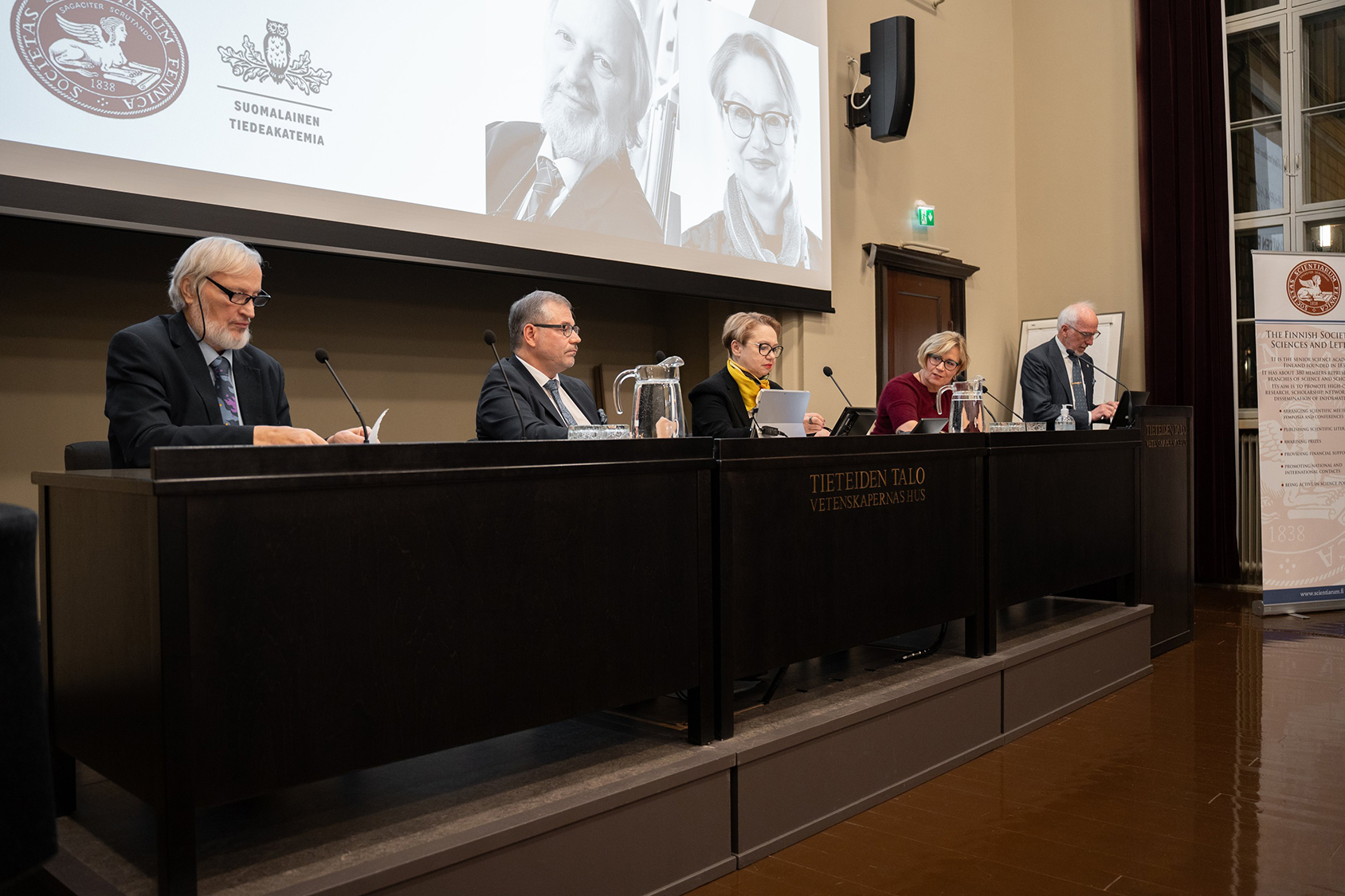
Other events
The Finnish Academy of Science and Letters celebrated its 115-year journey on 28 April together with members and invited guests at the Science Gala at the Old Student House. A housewarming party was organized in October at the Mariankatu facilities of the Academy for the members and stakeholders of the Academy; the office of the Academy moved to its current location in spring 2020, but no celebrations were held at the time due to COVID-19.
A Science Matinee was organized for members on 30 May at the Väisälä Hall of the Academy. The theme of the event was multidisciplinarity. The topic was addressed by Academician of Science Riitta Hari, Research Director and Chair of the Finnish Climate Change Panel Markku Ollikainen and Professor of Urban Geography Mari Vaattovaara.
During the year, the Academy also engaged in extensive cooperation with other parties in the field in terms of events.
14 Jan. “Viestintäkulttuuri ja uuden alku” (“Communication culture and a new beginning”)
- Part of the programme of the Science Forum, in cooperation with Suomen Kuvalehti. University of Helsinki and live stream online
- Discussion by Vice President of the Academy, Professor Tuula Linna, Professor Roope Uusitalo, Postdoctoral Researcher Johanna Vuorelma and non-fiction writer, PhD Tiina Raevaara
23 May “Freedom of Research – Contemporary and Transnational Perspectives”
- Panel discussion in cooperation with the Helsinki Collegium for Advanced Studies, University of Helsinki. Think Corner and live stream online
- Discussion by Academician of Science Eva-Mari Aro, University Researcher Andrew Graan, Professor Arto Laitinen and Postdoctoral Researcher Johanna Vuorelma
26 Oct. “Great Nobel debate”
- In cooperation with other academies of science and Helsingin Sanomat. Sanoma House and live stream online
- The event featured presentations on the 2023 Nobel laureates, their research topics and the significance of their research
7 Nov. “TKI-rahoitus kasvaa. Miten potti jaetaan?” (“More funding for RDI. How will the money be divided?”)
- Panel discussion in cooperation with the Finnish Society of Sciences and Letters. House of Science and Letters and live stream online
- The topic was addressed by President of the Academy of Finland Paula Eerola, Director of the Confederation of Finnish Industries Riikka Heikinheimo, President of Tampere University Keijo Hämäläinen and Academician of Science Ilkka Niiniluoto
Of the groups of the Academy, the Chemistry group held an event on 28 April entitled “Chemistry in Finland – Solutions to Major Challenges” and the Jurisprudence group held a seminar on 24 November entitled “Oikeustutkimus 2023” (“Legal research 2023”). Both events were organized at the House of Science and Letters.

Science and Policy
In 2023, the Science and Policy activities of the Finnish Academy of Science and Letters grew significantly due to the Phenomenon Map project funded by the Jane and Aatos Erkko Foundation. The Science and Policy team grew from two to five people. During the period, the team produced seven different knowledge syntheses both for public debate and directly for the highest political offices in Finland (the Prime Minister and the State Secretary at the Prime Minister’s Office). Over the course of the year, more than 200 researchers and 15 scientific organizations contributed to these activities.
During the year, more than 310 separate stakeholder discussions were held, and 20 speeches on the activities were given at public events in Finland and abroad. The approaches developed in the past few years attracted much interest abroad, including in the European Commission, the UN, international networks, and science academies.
Highlights of the activities in 2023:
- Production of written knowledge syntheses. Seven knowledge syntheses were produced on topics ranging from old age to quantum technology, utilizing various data collection methods and publication formats.
- Data compilation methods, synthesizing different types of knowledge and knowledge formats. The production of written syntheses facilitated the internal development of ways to identify knowledge needs, implement effective data collection methods, systematically synthesize different types of knowledge, and produce easily understandable knowledge formats.
A digital knowledge matrix was also produced with the aim of seeking alternative ways to present knowledge to replace the traditional report format. - Initial assessment and light piloting of the opportunities offered by AI. The potential and limitations of using AI in the field of evidence-informed decision-making were examined. Two light pilots (the AI trial in medical foundations and the updated situational picture of the hydrogen economy) were also carried out to support the strategic planning and targeting of upcoming work.
- Materials to support the impact work of researchers. An online course open to all doctoral students was produced on the basis of the impact training course developed during the Sofi project (2019–2021), and the Researcher’s Handbook was put together to support the societal interaction of researchers.
- Strengthening dialogue with key international players. Dialogue was intensified with e.g. the Royal Society, the Leopoldina, KNAW in the Netherlands and the European Commission (Scientific Advice Mechanism, SAM) and the Joint Research Centre (JRC).
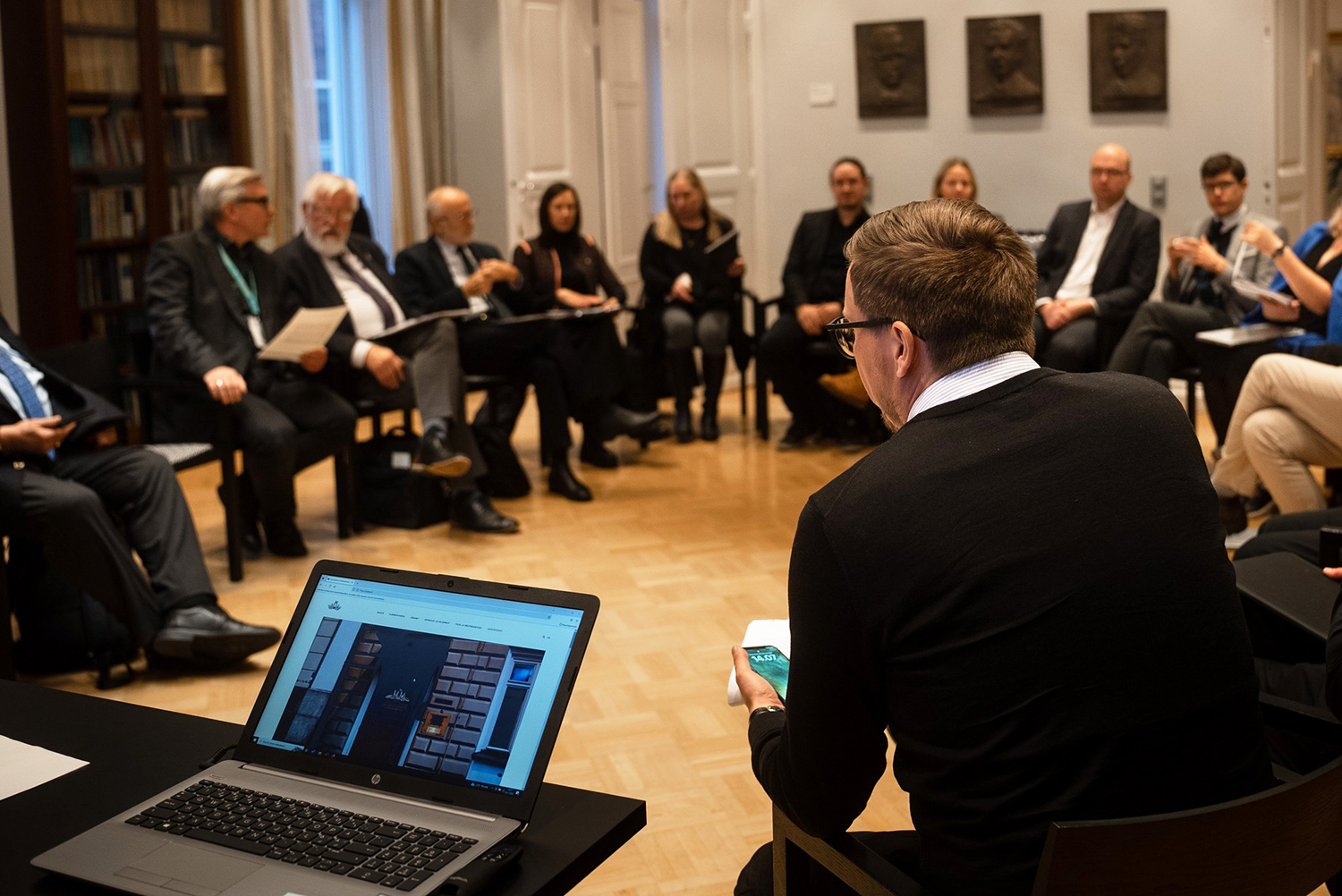
International activities
The Finnish Academy of Science and Letters strengthened existing and built new international relations, particularly under the Science and Policy theme. The Academy organized several discussions with European academies of science on evidence-informed decision-making and the role of academies of science in future societies. The Academy visited Leopoldina (German National Academy of Sciences) in Germany, KNAW (Royal Netherlands Academy of Arts and Sciences) in the Netherlands, and RSE (The Royal Society of Edinburgh) in Scotland. A remote meeting was held with SCNAT (Swiss Academy of Sciences), and the Estonian Academy of Sciences visited the facilities at Mariankatu. The Academy participated in the Annual Meeting of the European Science Advisors Forum in Vilnius as the Finnish representative. The Academy was an invited guest at the European Commission’s JRC (Joint Research Centre), WRR (The Netherlands Scientific Council for Government Policy), and the Cabinet Office in the United Kingdom. Activities were also presented at the Science Advice at Times of Crises conference of SAPEA (Science Advice for Policy by European Academies) in Brussels.
Contacts with international scientific organizations by the Finnish Academy of Science and Letters took place mainly under the auspices of the Council of Finnish Academies (CoFA), the cooperative body for the science academies in Finland. The Academy’s President was a member of the executive committee of CoFA and the Academy’s Vice President acted as their deputy. The Secretary General was also a member of the executive committee, but without a vote. The Academy was represented on CoFA’s International Affairs Committee (IAC) by Anna Mauranen, who also acted as the chairman of the committee, and by Olavi Nevanlinna. The chairman of CoFA’s Human Rights Committee was Liisa Laakso.
Through the medium of CoFA, members of the Finnish Academy of Science and Letters held positions of trust in several international scientific organizations: Mats Gyllenberg, Johanna Mappes, Pirjo Peltonen-Sainio, Craig Primmer, Jukka Seppälä and Maija Tenkanen in EASAC; Anna Mauranen, Ahti Salo and Mari Vaattovaara in ISC; Mika Kajava in UAI; Liisa Laakso in the International Human Rights Network; Krista Varantola and Risto Kunelius in ALLEA; Jukka Seppälä in SAPEA; and Elina Ikonen and Olli Vapalahti in IAP.
The Academy appoints members to various national committees. In the case of the Finnish National Committee of Arctic and Antarctic Research (SCAR, IASC), the Academy’s representative was Atte Korhola, with Juha Pekka Lunkka as his deputy. The representative on the National Committee for Astronomy (IAU) was Karri Muinonen. The representatives on the National Committee for Radio Science (URSI) were Esa Kallio and Karri Muinonen, with Ilya Usoskin as the deputy. Kimmo Kahma was the representative on the Finnish National SCOR Committee, Juha Pekka Lunkka on the National Committee for Quaternary Research (INQUA), Ilkka Norros on the National Committee on Theoretical and Applied Mechanics (IUTAM) and Juha Pekka Lunkka on the National Committee for Geology (IUGS).
The Academy was represented by President Kimmo Kaski and Secretary General Pekka Aula at the STS forum in Kyoto, Japan.
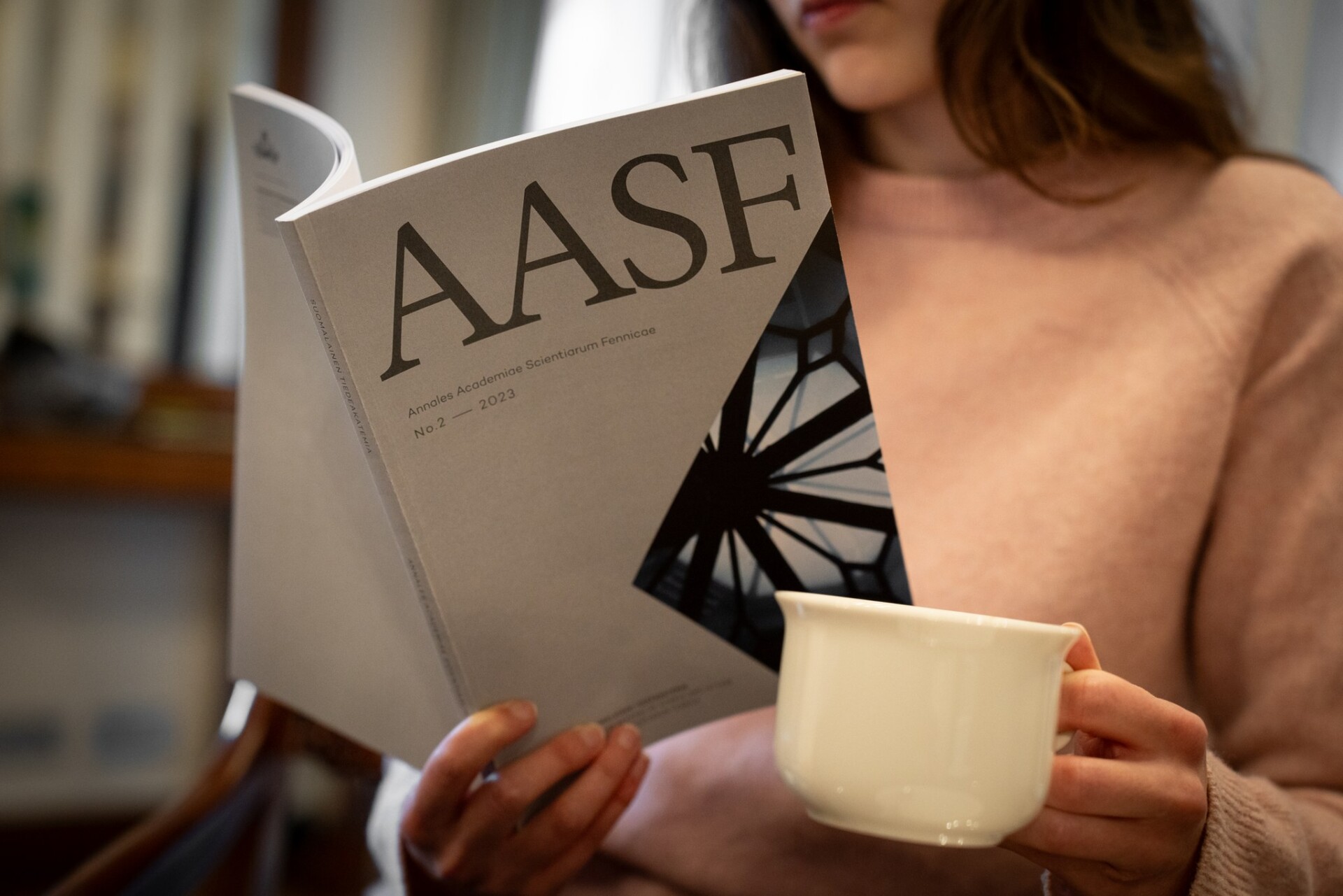
Publications
The multidisciplinary publication series of the Finnish Academy of Science and Letters Annales Academiae Scientiarum Fennicae (AASF) consolidated its activities in 2023. The first issue of the series was published in 2022, and according to plan, two issues were published in 2023: AASF 1/2023 in May and AASF 2/2023 in December. Both issues contained eight research articles and featured all three languages of the publication – Finnish, English and Swedish. The publication is freely available online at journal.fi and is also sold at Bookstore Tiedekirja.
The chairman of the Academy’s Publications Committee was Risto Nieminen and the vice chairman Anna Mauranen. The other members were Secretary General Pekka Aula, Kimmo Kaski, Heta Pyrhönen, Jari Eloranta, Jaakko Husa, Päivi Pahta, Tapio Salmi, Hannu Sariola and Erkki Tomppo. The members presented themselves as candidates for the Publications Committee. The Publications Committee held one meeting during the year.
The Year Book of the Academy 2022 was published in 2023 in Finnish and in English. The Year Book is freely available online on the Academy’s website.
During the year, the following publications were produced, mainly under the Science and Policy theme: Suomi muuttuu (“Finland in change”), a fact sheet for government negotiations; Ulkomaalaistaustaisten hyvinvointi (“Wellbeing of people with an immigrant background”), a knowledge synthesis for the Prime Minister’s Office; Science brief: Hydrogen in the Green Transition; Science brief: Quantum Technology; Terve vanhuus (“Healthy ageing”), a discussion paper; and Yhteiskunnallisen vaikuttamisen avaimet: Tutkijan käsikirja (”Researcher’s Handbook on Science-for-Policy”).
A joint publishing committee was established in the beginning of 1996 to coordinate the publications of the Finnish Academy of Science and Letters and the Finnish Society of Sciences and Letters. The committee is elected for a three-year term, and a representative of either the Academy or the Society is elected as chairman of the committee in alternating terms. The chairman for the term 2021–2023 is Jari Ojala who represents the Finnish Academy of Science and Letters.
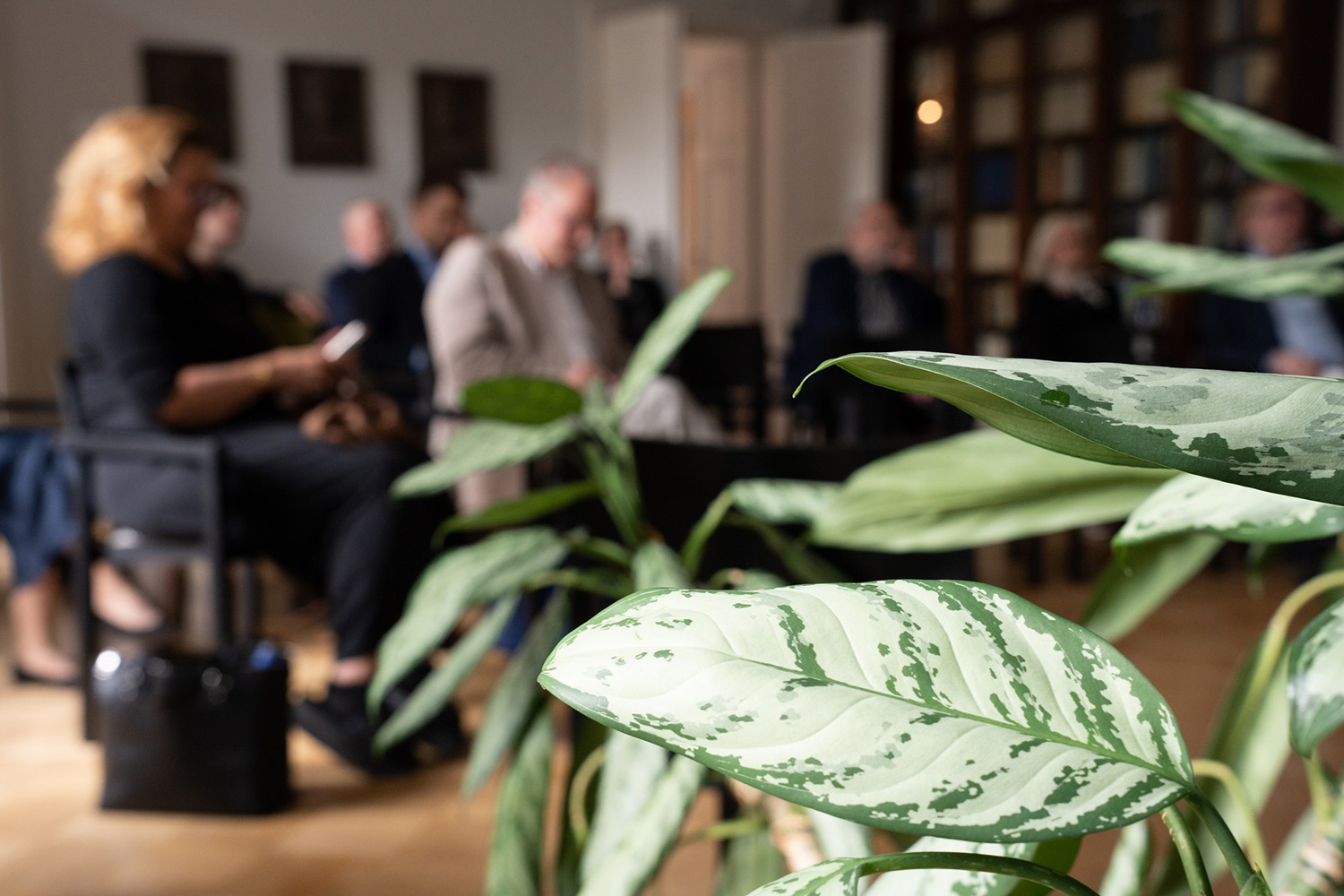
Other activities
The Finnish Academy of Science and Letters issued two comments, by request, during the year: on the draft of the Government Decree on the Research and Innovation Council and on the Decree on the Finnish Nature Panel and on the granting of a discretionary government grant for fulfilling the mandate of the Nature Panel.
Jaakko Kuosmanen was heard as a representative of the Academy at the Parliament’s Committee for the Future on quantum technology and at the Human Rights Centre as an expert on science and foresight.
During the year, the Governing Board of the Academy proposed members for several working groups and bodies by request. The Academy has representatives in several institutions and organizations both in Finland and abroad.
Anna Mauranen was a member in the International Affairs Forum for Higher Education and Research set up by the Ministry of Education and Culture for the term 2020–2023.
The Academy is a member of the Association of Finnish Foundations and the Federation of Finnish Learned Societies (TSV). It was represented on the board of TSV by Heta Pyrhönen (deputy Johanna Mappes) and Anna Mauranen (deputy Kimmo Kaski).
Pekka Ilmakunnas represented the Academy at TSV’s spring meeting in March and its autumn meeting in September, and Risto Nieminen was the Academy’s representative on the Steering Group of the Publication Forum.
The Academy was represented on the Board of Directors of the Alfred Kordelin Foundation by Jukka Seppälä (deputy Keijo Hämäläinen until 6 Nov. and Kimmo Kaski as of 7 Nov.) and Anna Mauranen (Mari Vaattovaara). The representatives in the Foundation’s section for science were Sami Pihlström (deputy Tuomas Forsberg) and Tapio Mappes (Gabriel Sanus). The representative in the section for public education was Markku Löytönen (Risto Nieminen), and in the section for literature Sari Kivistö (Tomi Huttunen). Helmi Järviluoma-Mäkelä (Arto Haapala) sat in the section for arts.
The Academy’s representatives on the Finnish Zoological and Botanical Publishing Board were Jaana Bäck and Riitta Julkunen-Tiitto, while Tapio Raunio represented the Academy in the Foundation for Foreign Policy Research. The Academy’s representative in the Finnish Foundations’ Post Doc Pool was Anna Mauranen, with Kaisa Nyberg as her deputy, and Secretary General Pekka Aula served as the Academy’s representative on the national LUMA Advisory Board. Anna Mauranen was nominated by the Academy as a member of the Board of Directors of the Finnish Research Impact Foundation.
The following members of the Academy sat on the scientific councils of the Research Council of Finland at the end of 2023: Petri Karonen and Matti Miestamo on the Scientific Council for Social Sciences and Humanities; Ari Jokinen, Timo Repo and Marjo Yliperttula on the Scientific Council for Natural Sciences and Engineering; and Jussi Kukkonen, Toni Laaksonen, Jorma Palvimo and Anne Toppinen on the Scientific Council for Biosciences, Health and the Environment. Petri Karonen and Jussi Kukkonen also acted as chairs of their respective councils. Klaus Elenius, Johanna Myllyharju as chair and Kirsi Tirri have served on the Board of the Research Council of Finland. Anne Kovalainen has been a member of the Strategic Research Council.
Pekka Aula represented the Academy at the annual general meeting of the Mariankatu 5–7 property company in March. Pekka Ilmakunnas sat on the board of the property company and also served as chair of the board.
Risto Nieminen was the Academy’s representative at the annual meeting of the Finnish Zoological and Botanical Publishing Board in March. The Academy was represented by Päivi Pahta at the spring meeting of the Association of Finnish Foundations and by Pekka Aula at the autumn meeting. Pekka Ilmakunnas represented the Academy at the shareholders’ meeting of Vaisala Oyj in March.
Kimmo Kaski represented the Academy on the Programme Committee of the Science Forum, and Pekka Aula in its steering group.
Young Academy Finland
The year 2023 was the sixth full year of operation for Young Academy Finland (YAF), founded with the aim of promoting science, especially from the viewpoint of young researchers who are just starting their academic careers. The Board of Young Academy Finland was chaired by Olli-Ville Laukkanen until 15 September, followed by Lasse Lehtonen on 16 September. Young Academy Finland had a total of 82 members and 74 alumni during the year.
The establishment of Young Academy Finland was to a large extent made possible by the donation of one million euros in 2017 from the Emil Aaltonen Foundation to the Finnish Academy of Science and Letters for establishing YAF. A separate Emil Aaltonen Fund was set up as a result of this donation. Young Academy Finland works in association with the Finnish Academy of Science and Letters. It issues its own annual report every year and submits it to the Governing Board of the Academy.
